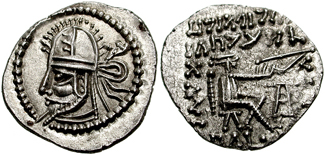
The death of Artabanos IV at the Battle of Hormizdgan did not necessarily mean that all resistance to Ardashir's rule came to a sudden end. The date of S88.17, a tetradrachm of Vologases VI (539 of the Seleucid Era = AD 227/8), indicates that about four years after the victory of Ardashir, an isolated issue in the name of the Parthian king was issued at Seleukeia on the Tigris. This probably attests a temporary secession from the Sasanian rule. At the same time, the Armenian writer Moses of Chorene informs us that a number of Parthian princes retreated to Armenia and put up resistance against the Sasanian takeover. Among the refugees, the name Tiridates is mentioned at several points. It is possible that a certain Tiridates, who might well have led the rebellion or resistance against Ardashir, struck the coins with the portrait of the last Parthian ruler, Artabanus IV, but added his own name under the first line of the reverse legend that reads " 'rtbnw MLK' = King Artabanus ." The absence of a royal title for Tiridates implies that he was no more than a leader of the opposition.
KINGS of PARTHIA. Tiridates, Parthian prince(?),/B>. 216-? AD. AR Drachm (3.75 gm). Ekbatana mint. Diademed bust left, forked beard, wearing tiara with earflap; abbreviated name (of Artabanos) in Parthian script behind / Degraded legend [but first line: 'King Artabanos' in Parthian script, and second line: 'Tiridates' in Parthian script], Arsakes I seated right on throne, holding bow; monogram below bow. Sellwood 89.4; D. Sellwood, "The End of the Parthian Dynasty" in NumCirc June 1990, pg. 157, 4; Shore -; BMC Parthia -; MACW -.